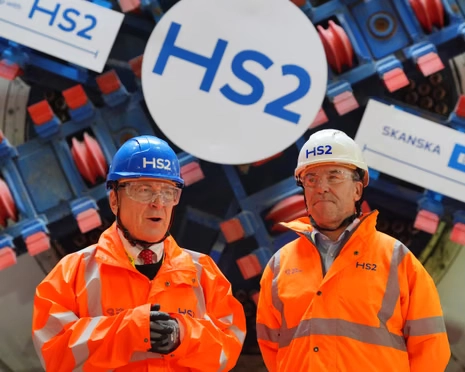UK (Parliament Politics Magazine) – HS2 chief Mark Wild told MPs the project is behind schedule, blaming early construction without full approvals for delays and soaring costs.
As reported by The Independent, HS2’s chief engineer admitted the project is only halfway done, despite original plans calling for construction to be largely complete by now.
What did Mark Wild say caused HS2’s major delays?
The HS2 project head said delays stemmed from inefficiencies caused by launching construction before securing proper design plans and necessary permissions.
Speaking to the Commons Transport Select Committee, Mark Wild stated,
“The construction of the civil engineering should have been largely completed by now. The reality is we’re about 60 per cent complete.”
When quesitoend about the reasons for the dealy, he said,
“It’s a very, very important lesson – the projects must not be mobilised and commenced if you haven’t got the design and consents, because the productivity of the teams, the hard working teams, is so leveraged if you’re waiting for the design.”
According to him, starting construction without incomplete designs played a significant role in delays, more than the project’s high-speed ambitions.
The chief executive stated,
“It’s probably much more important than the effective speed. I do agree, the speed, the trains per hour, and the tonnage have had a huge effect on the spec.”
He said,
“I think when all said and done, the cost exceedence though has mostly been inefficiency of work, because we started too soon. I think that will be revealed as the most dominant effect.”
Mr Wild pointed out the pandemic and inflation driven by Russia’s invasion of Ukraine as additional factors behind the recent delays.
How did HS2’s cost rise from £37bn to £66bn?
The first phase of the HS2 line, connecting London and Birmingham, had a planned completion date of 2026.
The timeline was later rescheduled to between 2029 and 2033, but Transport Secretary Heidi Alexander admitted last month there is “no route” to meet that deadline.
HS2’s 2013 estimated cost was £37.5 billion, covering the full network including extensions later scrapped to Manchester and Leeds.
However, last June, its projected cost for the London–Birmingham section could rise to as much as £66 billion.
What are the Public Accounts Committee’s Concerns over HS2?
MPs on the Public Accounts Committee warned earlier this year that the government and HS2 might lack the capacity and skills to complete the London to Birmingham high-speed rail.
The influential committee of MPs called the rail project a case study in “how not to run a major project.”
The PAC warned that even after scrapping HS2’s northern leg to save costs, the government may still struggle to complete the reduced scheme.
The committee report said delivering the reduced HS2 project would still represent “very poor value for money,” highlighting the £100 million cost of a protection tunnel in Buckinghamshire as an example of waste.
Then-Prime Minister Rishi Sunak scrapped plans to extend HS2 between the West Midlands and Manchester in October 2023.
Key facts about the HS2 project
- HS2’s Old Oak Common station will help West London’s economy grow by £10 billion in 10 years. It will create 19,000 jobs and 22,000 new homes.
- By 2025, most HS2 tunnels (82%) will be dug, but work on the Euston tunnels has not started yet.
- After HS2 was approved, there were 22% more building plans near Old Oak Common. The value of these plans grew by 325% to £3.41 billion.


